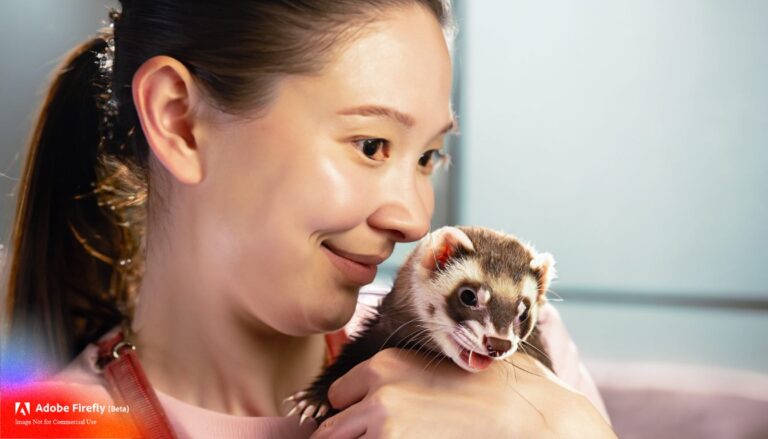
Are you a proud ferret owner who’s wondering if your furry friend can wear diapers? Well, you’ve come to the right place! As an experienced ferret enthusiast, I’ve delved into the world of ferret care and can provide you with all the information you need. In this article, I’ll answer the burning question: Can ferrets wear diapers? We’ll explore the pros and cons, discuss the practicality, and share some expert tips to help you make an informed decision. So, let’s dive in and find out if diapers are a viable option for your mischievous little ferret!
The Basics of Ferret Care
As an experienced ferret enthusiast, I believe it’s important for every ferret owner to understand the basics of ferret care. Taking care of these adorable and curious creatures can be a rewarding experience, but it does require some knowledge and effort. In this section, I’ll cover the key aspects of ferret care to help you ensure that your furry friend is happy and healthy.
Diet
Proper nutrition is crucial for your ferret’s well-being. These little guys have unique dietary needs, so it’s important to feed them a high-quality, specialized ferret food. Ferrets are obligate carnivores, which means that their diet should consist primarily of meat-based protein. Avoid feeding them cat or dog food, as these don’t meet their nutritional requirements. A healthy ferret diet should include:
- High-quality ferret kibble or raw diet designed specifically for ferrets.
- Small amounts of cooked eggs or meat as occasional treats.
- Fresh water should always be available.
Avoid feeding your ferret sugary treats or fruits, as they can upset their delicate digestive system. Regularly clean their food bowls and ensure that they have access to clean water at all times.
Hygiene and Grooming
Maintaining good hygiene is essential for your ferret’s health. Here are some key aspects of ferret hygiene and grooming:
- Litter training: Ferrets are naturally clean animals and can be easily litter trained. Provide them with a litter box filled with a dust-free, unscented litter. Clean the litter box daily to prevent odors and keep your ferret’s living environment fresh.
- Bathing: Ferrets have a distinct musky odor, but don’t worry, regular bathing can help reduce it. Avoid bathing them too frequently, as it can dry out their skin. Aim for a bath once every few months using a gentle ferret shampoo.
- Nail trimming: Like other pets, ferrets’ nails can grow long and sharp. Regular nail trims are necessary to prevent injury to you and to your ferret. Use small, specialized nail clippers designed for ferrets and be careful not to trim too close to the quick.
Understanding Ferret Behavior
Ferrets are fascinating creatures with unique behaviors that can be both endearing and challenging to understand. In order to provide the best care for your furry friend, it’s important to have a good grasp of their behavior and instincts. Let’s dive into a few key aspects of ferret behavior:
Socialization
Ferrets are highly social animals and thrive on companionship. They are naturally curious and love to explore their surroundings. As a responsible ferret owner, it’s crucial to provide ample opportunities for social interaction and mental stimulation. This can be achieved through playtime, interactive toys, and regular socialization with other ferrets or humans.
Playfulness
One of the most delightful traits of ferrets is their playful nature. They have boundless energy and are constantly on the go, investigating every nook and cranny. Providing them with plenty of toys and engaging in interactive play sessions not only keeps them entertained, but also helps to prevent boredom and destructive behavior.
Digging and Burrowing
Ferrets have an innate instinct to dig and burrow. This behavior is deeply ingrained in their natural instincts as a means of hunting and creating a safe space. As a result, it’s important to provide them with appropriate outlets for this behavior. Specially designed ferret tunnels, dig boxes with suitable materials, and hiding spots can fulfill their need to dig and burrow.
Scent Marking
Another aspect of ferret behavior is scent marking. This is a way for ferrets to communicate with each other and mark their territory. They have scent glands that produce a musky odor, which they use to leave their mark on objects and surfaces. It’s important to note that this scent is normal and cannot be completely eliminated. However, regular cleaning and providing designated areas for scent marking can help manage the odor.
Chewing and Nipping
Ferrets have a natural inclination to chew and nip. This behavior is part of their exploration and play, but it can also be a sign of boredom or teething. Providing appropriate chew toys and raw bones can help redirect this behavior and prevent them from chewing on inappropriate objects.
Understanding the behavior of your ferret is essential for their overall well-being and can strengthen the bond between you. By recognizing their instincts and providing outlets for their natural behaviors, you can keep your ferret happy, healthy, and entertained.
Exploring the Pros and Cons of Ferret Diapers
When it comes to keeping our furry friends clean and mess-free, some ferret owners may consider using diapers as a solution. While the idea of putting a diaper on a ferret might seem unusual, it does have its benefits and drawbacks. In this section, I’ll explore the pros and cons of using ferret diapers.
Pros of using ferret diapers:
- Minimize mess: One of the main advantages of using ferret diapers is that they help minimize messes around the house. Ferrets can be notorious for their accidents, especially when they are not properly trained. Diapers can provide a barrier that prevents urine or feces from soiling your furniture or carpets.
- Convenience: Diapers can be a convenient solution for ferret owners who may not have the time or ability to constantly clean up after their ferrets. It’s a practical way to keep your ferret clean while also making your life a little easier.
- Travel-friendly: If you enjoy taking your ferret on adventures or traveling with them, diapers can be a useful accessory. They can help ensure that your ferret stays clean and comfortable, whether you’re on a long road trip or visiting friends and family.
- Comfort and mobility: Some ferrets may find wearing diapers uncomfortable or restrictive. It may take time for them to adjust to wearing one, and you’ll need to monitor their mobility to ensure they can move freely and comfortably.
- Training challenges: While diapers can help contain messes, they are not a substitute for proper litter training. It’s essential to still work on litter training your ferret to prevent accidents and maintain good hygiene habits.
- Potential health issues: Prolonged use of diapers can sometimes lead to skin irritations or infections if not changed regularly. It’s crucial to check your ferret’s diaper frequently and change it as needed to avoid any potential health issues.
Using diapers for ferrets can be a practical solution for minimizing messes and ensuring cleanliness, especially in specific situations like traveling. However, it’s essential to consider the comfort of your ferret and prioritize proper litter training. Regular monitoring and maintenance are important to avoid any potential health issues that may arise from using diapers.
Addressing Practical Concerns
When considering whether or not to use diapers for your ferret, it’s important to address some practical concerns. While diapers can be a convenient solution for certain situations, it’s crucial to understand the potential challenges and drawbacks that come with them. Here are a few practical concerns to consider:
1. Size and Fit: One of the main concerns when it comes to using diapers for ferrets is finding the right size and fit. Ferrets come in different sizes, and finding a diaper that fits snugly without causing discomfort can be a bit challenging. It’s essential to choose diapers specifically designed for ferrets to ensure a proper fit and to prevent any discomfort or rubbing against their delicate skin.
2. Training: Diaper training can be a bit of a process. Like any training, it requires time, patience, and consistency. Some ferrets may take to diapers quickly, while others may resist or have accidents initially. It’s important to be prepared for accidents and to maintain a positive and consistent approach during the training process. Proper litter training should still be a priority to ensure your ferret’s overall hygiene.
3. Potential Health Issues: While diapers can help minimize messes, it’s crucial to regularly monitor and maintain their use to avoid any potential health issues. Because diapers can trap moisture against the ferret’s skin, it’s important to check for any signs of irritation or discomfort. Additionally, diapers should be changed frequently to prevent bacterial growth and maintain cleanliness.
4. Comfort and Freedom of Movement: Another concern when it comes to using diapers for ferrets is their comfort and ability to move freely. While some ferrets may adjust well to wearing diapers, others may find them restrictive or uncomfortable. It’s essential to observe your ferret’s behavior and ensure that they can move, play, and groom themselves comfortably while wearing a diaper.
It’s important to consider these practical concerns before deciding whether or not to use diapers for your ferret. While they can be a useful tool in certain situations, it’s vital to prioritize your ferret’s well-being and ensure that their comfort and health are not compromised.
Expert Tips for Using Ferret Diapers
When it comes to using diapers for your ferret, there are a few expert tips that can help ensure a smooth and comfortable experience for both you and your furry friend. Here are some essential tips to keep in mind:
- Find the Right Size and Fit: Just like humans, ferrets come in different shapes and sizes. It’s crucial to find a diaper that fits your ferret properly. Using a diaper that is too tight or too loose can result in discomfort or leaks. Take accurate measurements of your ferret’s waist and consult the sizing guide provided by the diaper manufacturer to find the perfect fit.
- Introduce Diapers Gradually: Diaper training is an essential process that requires patience and consistency. Start by introducing the diaper for short periods, gradually increasing the duration as your ferret gets accustomed to wearing it. Reward your ferret with treats and praise to create positive associations with diaper wearing.
- Regularly Monitor and Change Diapers: To maintain your ferret’s comfort and prevent any potential health issues, it’s important to regularly monitor and change the diapers. Check the diaper frequently for any signs of soiling or discomfort. Changing the diaper promptly will not only keep your ferret clean but also prevent skin irritation and bacterial growth.
- Choose the Right Type of Diaper: There are different types of diapers available for ferrets, including washable cloth diapers and disposable ones. Consider your preferences and your ferret’s needs when choosing the right type. Washable diapers can be a more eco-friendly option, while disposable ones offer convenience.
- Ensure Comfort and Freedom of Movement: While wearing a diaper, it’s crucial to prioritize your ferret’s comfort and freedom of movement. Ensure that the diaper is not too tight or restrictive, allowing your ferret to move, play, and use the litter box comfortably.
By following these expert tips, you can ensure that using diapers for your ferret becomes a hassle-free and comfortable experience. Remember, choosing the right diaper, monitoring and changing it regularly, and prioritizing your ferret’s well-being are essential for a happy and healthy furry companion.
Conclusion
Finding the right size and fit for a ferret’s diaper is crucial to ensure their comfort and prevent leaks. Gradual introduction and positive reinforcement are key when it comes to training your ferret to wear diapers. Regular monitoring and changing of diapers are necessary to maintain their health and hygiene.
When choosing a diaper, consider the type that best suits your preferences and your ferret’s needs, whether it’s a washable cloth diaper or a disposable one.
It’s important to prioritize your ferret’s well-being and ensure they have the freedom of movement while wearing a diaper. By following these expert tips, you can provide a hassle-free and comfortable experience for your ferret.
Remember, using diapers for ferrets can be a practical solution for certain situations, such as travel or managing incontinence. However, it’s always a good idea to consult with a veterinarian to address any underlying health issues that may be causing the need for diapers.
Overall, with the right approach and care, ferrets can wear diapers comfortably and safely.






